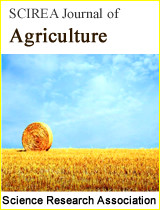Empirical Research on Cooperative Innovation Performance of Agricultural Scientific Research Team and Effect Factors
DOI: 10.54647/agriculture21200 133 Downloads 13885 Views
Author(s)
Abstract
With the expansion of agricultural scientific research activity areas, agricultural scientific research team or organization gradually developed into the basic unit of agricultural scientific research activity.Through the visit, discussion and small meeting communication or carry out questionnaire investigation, etc, investigated the situation of national agricultural scientific research innovation team, using DEA-Tobit model, measure the cooperative innovation performance of agricultural scientific research team, and analysied the direction and degree which environmental factors on agricultural scientific research team cooperative innovation performance. The empirical results show that the mean of comprehensive efficiency was 0.4516, and with large room for improvement, the mean of pure technical efficiency was 0.6472, scale efficiency average was 0.6978; To improve the cognitive level of team goal can obviouslly improve the cooperative innovation performance, but title structure, familiar degree of Internal members, the rationality of expenditure is also decision elements of cooperative innovation performance. In addition, cross-team communication, local government support and relying on the unit properties to the innovation performance effects not get powerful data support, it is not obvious. According to the above, put forward the countermeasures and Suggestions of proposing stable investment mechanism, optimizing the internal structure, strengthening the cooperative innovation and so on.
Keywords
agricultural scientific research team;cooperative innovation performance; effect Factors; DEA - Tobit model
Cite this paper
Li Peng,
Empirical Research on Cooperative Innovation Performance of Agricultural Scientific Research Team and Effect Factors
, SCIREA Journal of Agriculture.
Volume 6, Issue 2, April 2021 | PP. 10-24.
10.54647/agriculture21200
References
| [ 1 ] | Jiang Rifu, Huo Guoqing, Tan Hongjun, Guo Chuanjie. Research on the factors influencing the knowledge innovation performance of scientific research teams--an analysis based on the survey of national scientific research institutions in China[J]. Scientific Research, 2007, 25(2): 365-372. |
| [ 2 ] | Wu Yang, Su Jun. Research on the complex characteristics of scientific research team knowledge innovation system and the mechanism of its synergistic mechanism[J]. Science and Technology Research, 2012(01):156-165. |
| [ 3 ] | Eva Kirner,Steffen Kinkel,Angela. "Jaeger innovation paths and the innovation performance of low-technology firms -An empirical analysis of the German industry‖,Research Policy,2009,38 (3):447-458. |
| [ 4 ] | Shang Runzhi, Long Jing. Innovation management of R&D teams in high-tech firms: the effects of network structure, transformational leadership on innovation performance [J]. Science Management Research, 2010, 28(5): 76-79. |
| [ 5 ] | Jin Linlin. Research on the elements of knowledge management system in university research teams: an empirical analysis from the innovation team of the Ministry of Education[J]. Management Review, 2010, 22(5): 29-34, 55. |
| [ 6 ] | Ute R. Hülsheger, Neil Anderson, Jesus F. Salgado. "Team-Level Predictors of Innovation at Work:A Comprehensive Meta- Analysis Spanning Three Decades of Research", Journal of Applied Psychology, 2009,94(5):1128-1145. |
| [ 7 ] | Chen Xeguang, Yu Hong, Fan Lijun. Overseas embedding characteristics, knowledge search and innovation performance of R&D team--an empirical study based on Zhejiang high-tech enterprises[J]. Scientific Research, 2010, 28(1): 151-160. |
| [ 8 ] | James D.Adams,Grant C.Black,J.Roger Clemmons.Paula E.Stephan. "Scientific teams and institutional collaborations: Evidence from U.S. universities, 1981-1999", Research Policy, 2005,34(3):259-285. |
| [ 9 ] | Hans J. Thamhain, "Managing innovative R&D teams", R&D Management, 2003, 33(3): 297-311. |
| [ 10 ] | Yuwen Liu, Robert T. Keller and Hsi-An Shih. "The impact of team-member exchange, differentiation, team commitment, and knowledge sharing on R&D project team performance",R&D Management,2011,41(3):274-287. |
| [ 11 ] | Li Zhihong, Zhu Tao, Lai Wendi. Research on the tacit knowledge sharing willingness of innovative research teams in colleges and universities[J]. Scientific Research, 2010, 28(4):581-590. |
| [ 12 ] | Jin Linlin, Li Dehuang. The influence of scientific research team's disciplinary background characteristics on innovation performance-using knowledge exchange and sharing and knowledge integration as mediating variables. Scientific Research, 2012(01):111-123. |
| [ 13 ] | Geng Zizhen, Liu Xinmei, Shen Li. A study on the mechanism of cooperative goals to promote creativity in research teams[J]. Scientific Research Management, 2012(08):113-119. |
| [ 14 ] | Zhang Pengcheng, Peng Han. Research on the relationship between research cooperation network characteristics and team knowledge creation[J]. Research Management, 2011, 32(7): 104-112. |
| [ 15 ] | Krsto Pandza, Terry A. Wilkins, Eva A. Alfoldi. "Collaborative diversity in a nanotechnology innovation system:Evidence from the EU Framework Programme",Technovation,2011,31(9):476-489. |
| [ 16 ] | Deng Xiuquan, Kang Yunpeng, Xi Junfeng, Bai Bing, Mao Yangshuo. Research on the construction of resource capacity model of university research team and its application[J]. Scientific Research, 2012(01): 102-110. |
| [ 17 ] | Xiao Dingding, Zhu Guilong. Research on the construction of core competencies of research teams in universities - using team mental model as a mediating variable [J]. Science and Technology Management, 2012(01):173-180. macos/deepLFree.translatedWithDeepL.text |

